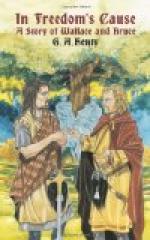Among the fugitive remains of the English army were a considerable body of Welsh, who, being lightly armed, fled at full speed toward the Border, but being easily distinguished by their white dresses and the absence of defensive armour, almost all were slain by the peasantry. The Earl of Hereford, the Earl of Angus, Sir John Seagrave, Sir Anthony Lucy, Sir Ingram de Umfraville, with a great number of knights, 600 men-at-arms, and 1000 infantry, keeping together, marched south toward Carlisle.
As they passed Bothwell Castle, which was held by the governor for England, the earls and knights entered the castle, their followers remaining without; but the governor, on hearing the result of the battle, closed the gates and took all who had entered prisoners, and, changing sides, handed them over to Bruce. Their followers continued their march south, but were for the most part slain or taken prisoners before they reached the Border.
When all resistance had ceased on the field the victors collected the spoil. This consisted of the vast camp, the treasures intended for the payment of the army, the herds of cattle, and stores of provisions, wine, and forage; the rich wearing apparel and arms of the knights and nobles killed or made prisoners, many valuable horses, and the prisoners who would have to be ransomed, among whom were twenty-two barons and sixty knights.
The spoil was estimated at 200,000 pounds, equal to 3,000,000 pounds of money in these days. The king refused to take any share in this plunder, dividing it wholly among his troops. 30,000 English lay dead on the field, including 200 knights and 700 esquires, and among the most distinguished of the dead were the Earl of Gloucester, Sir Giles de Argentine, Lord Robert Clifford, Sir Edmund Manley, seneschal of England, Sir William de Mareschal, Sir Payne Tybtot, and Sir John Comyn. Sir Marmaduke de Twenge was among the prisoners.




